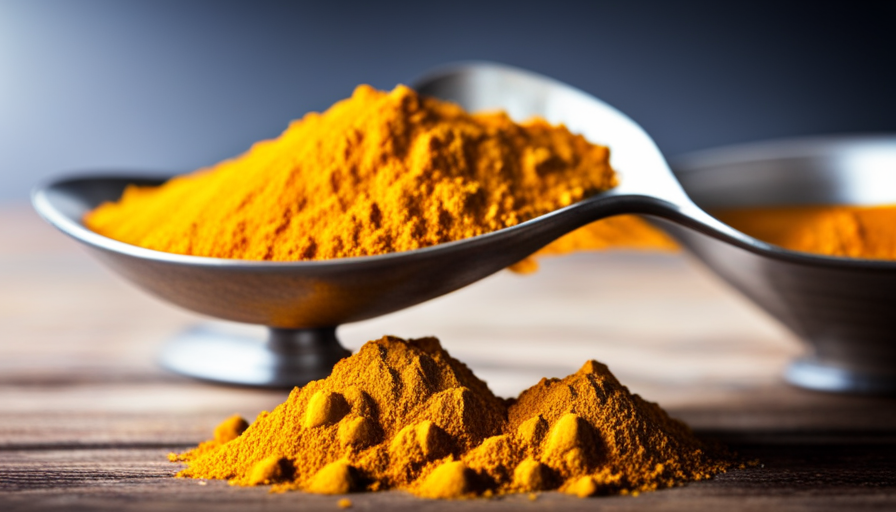I, like many others, have always been attracted to the bright yellow color and earthy taste of turmeric. However, besides its use in cooking, this spice has gained popularity for its potential health advantages. In particular, its active component, curcumin, is praised for its anti-inflammatory and antioxidant qualities.
While supplements containing curcumin have become a popular way to incorporate this spice into one’s daily routine, turmeric tea has also gained attention as a potential health-promoting beverage.
In this article, I will explore the question: is turmeric tea as good as supplements? By examining the differences between the two forms and their potential benefits, we can better understand how to incorporate turmeric into our diets and reap its potential health benefits.
Key Takeaways
- Turmeric tea is a natural and low-calorie way to incorporate turmeric into the diet and has anti-inflammatory properties beneficial for those with joint pain or other inflammatory conditions.
- Turmeric supplements may contain higher concentrations of curcumin and other active ingredients that can be more potent than the natural plant form, making them better for improving athletic performance or building muscle.
- Turmeric supplements can have side effects, such as stomach upset and digestive issues, and may interact with certain medications, so it’s important to speak with a healthcare professional before starting to take them.
- Incorporating both turmeric supplements and tea into the daily routine can provide a more comprehensive approach to reaping the benefits of turmeric’s anti-inflammatory properties, but consulting with a healthcare professional is recommended to determine the proper dosage and any safety concerns.
Understanding Curcumin and Its Benefits
Let’s dive into the science behind curcumin and why it’s become such a popular supplement for its numerous health benefits.
Curcumin is a natural compound found in turmeric, a spice commonly used in Indian and Middle Eastern cuisine. It has been shown to have anti-inflammatory, antioxidant, and anticancer properties, among many others. However, the challenge with curcumin is its poor absorption and bioavailability, meaning that the body cannot easily absorb and utilize the compound.
To overcome this, turmeric supplements have been developed with varying dosages and brand comparisons. These supplements are formulated to improve curcumin absorption and bioavailability, making it easier for the body to benefit from the compound. However, it’s important to note that turmeric supplements can also have side effects, such as stomach upset and digestive issues.
Alternatively, turmeric can also be consumed in the form of turmeric tea, which is made by mixing turmeric powder with hot water and other ingredients like honey or ginger. This alternative use of turmeric is believed to have benefits for the skin, weight loss, and even arthritis.
With a better understanding of curcumin and its benefits, let’s explore the differences between turmeric tea and supplements.
Turmeric Tea vs. Supplements: What’s the Difference?
There’s a significant contrast in the effectiveness of ingesting turmeric through natural means versus via manufactured pills. Turmeric tea benefits come from the plant’s natural compounds, such as curcumin, that can promote anti-inflammatory and antioxidant effects on the body. However, turmeric supplements may contain higher concentrations of curcumin and other active ingredients that can be more potent than the natural plant form.
Turmeric supplements comparison with turmeric tea also reveals that supplements may have a longer shelf life and easier dosing, making them a more convenient option for some individuals. Nevertheless, some studies suggest that turmeric in its natural form can be more readily absorbed by the body, making turmeric tea an effective way to incorporate the herb into one’s diet. As such, understanding the differences between turmeric tea and supplements can help individuals make informed decisions about how to consume this beneficial herb.
When it comes to potential benefits of turmeric tea, there are many to explore.
Potential Benefits of Turmeric Tea
As someone who’s interested in natural health remedies, I’ve been exploring the potential benefits of turmeric tea.
From my research, it seems that turmeric contains anti-inflammatory properties that could potentially help with conditions like arthritis and joint pain.
Additionally, turmeric tea may also support digestive health by aiding in digestion and reducing bloating.
Finally, some studies suggest that turmeric may also help support the immune system, making it a great addition to one’s overall wellness routine.
Anti-inflammatory Properties
To fully benefit from the anti-inflammatory properties of turmeric, you should consider incorporating turmeric supplements into your daily routine, as well as drinking turmeric tea.
While turmeric tea is a great way to consume turmeric, it may not provide enough of the active ingredient, curcumin, to have a significant anti-inflammatory effect. This is because curcumin content can vary greatly depending on the recipe and dosage used.
Turmeric supplements, on the other hand, are standardized to contain a specific amount of curcumin, making it easier to ensure you’re getting a consistent and effective dose. Studies have shown that taking turmeric supplements can have a significant anti-inflammatory effect, reducing inflammation markers in the body.
Therefore, incorporating both turmeric supplements and tea into your daily routine can provide a more comprehensive approach to reaping the benefits of turmeric’s anti-inflammatory properties.
When it comes to digestive health, turmeric has also been shown to have beneficial effects.
Digestive Health
You may be surprised to learn that approximately 70 million people in the United States suffer from digestive disorders. Having a healthy gut is crucial for overall well-being, and turmeric has been shown to have many benefits for digestion.
Here are some things to consider when deciding between turmeric tea and supplements for digestive health:
- Turmeric tea can be a soothing and enjoyable way to incorporate turmeric into your diet. It may also have additional benefits beyond just the turmeric, such as promoting relaxation and reducing stress.
- However, turmeric supplements can provide a more concentrated dose of the active ingredient, curcumin, which has been shown to have anti-inflammatory and antioxidant effects that benefit digestion. Additionally, supplements may be more convenient for those who don’t enjoy the taste of turmeric or don’t have the time to prepare tea.
Overall, both turmeric tea and supplements can be beneficial for digestive health. It’s important to consider your personal preferences and lifestyle when deciding which option to choose.
In the next section, we’ll explore how turmeric can also support the immune system.
Immune System Support
Boost your immune system with the help of a powerful natural ingredient that can strengthen your body’s defenses and keep you healthy. Turmeric, a spice commonly used in Indian cuisine, has been used for centuries for its medicinal properties. This yellow-orange spice contains a compound called curcumin, which has been shown to have anti-inflammatory and antioxidant properties. These properties make it an excellent ingredient for supporting your immune system.
Turmeric tea is one way to incorporate this spice into your diet. The nutritional value of turmeric tea depends on the preparation method. To get the most benefit, it’s best to simmer turmeric root or powder in water for at least 10 minutes. You can consume it as is or add other ingredients such as ginger or honey for added flavor and benefits.
While turmeric tea can be a tasty and beneficial addition to a healthy lifestyle, it may not provide the same potency as a turmeric supplement. In the next section, we will explore the potential benefits of turmeric supplements.
Potential Benefits of Turmeric Supplements
Surely, supplementing with turmeric can support your overall wellness. However, it’s important to note that the effectiveness of turmeric supplements depends on the dosage and absorption rate.
Studies have shown that higher doses of curcumin, the active ingredient in turmeric, may be necessary to see significant health benefits. It’s also important to choose a supplement that’s formulated for optimal absorption, as curcumin has poor bioavailability on its own.
While turmeric supplements can offer many potential benefits, it’s important to be aware of possible side effects. Some individuals may experience gastrointestinal issues such as nausea, diarrhea, or indigestion when taking turmeric supplements. It’s also important to note that turmeric supplements may interact with certain medications, such as blood thinners.
As with any supplement or medication, it’s important to speak with a healthcare professional before starting to take turmeric supplements.
When choosing the best form of turmeric for you, it’s important to consider your individual needs and preferences. Some individuals may prefer taking supplements in capsule form, while others may prefer adding turmeric powder to their meals or drinking turmeric tea.
By understanding the potential benefits and risks of turmeric supplements, you can make an informed decision about how to incorporate this powerful spice into your wellness routine.
Choosing the Best Form of Turmeric for You
When it comes to choosing the best form of turmeric for me, I consider my health goals, personal preference, and consult with a healthcare professional.
As someone who wants to improve my overall health and wellness, I want to make sure that the form of turmeric I choose aligns with my goals. Additionally, I take into account my personal preferences, such as whether I prefer capsules or powders.
Lastly, I always consult with my healthcare professional to ensure that the form of turmeric I choose is safe and effective for me.
Health Goals
You want to improve your overall health and well-being, and incorporating turmeric tea into your daily routine can be a delicious and natural way to achieve your health goals. Turmeric tea is a great option for those with dietary restrictions or who are looking for a low-calorie way to incorporate turmeric into their diet.
Additionally, turmeric tea has been shown to have anti-inflammatory properties, which can be beneficial for those with joint pain or other inflammatory conditions. However, it’s important to note that turmeric tea may not be as effective as supplements for those with specific health goals.
For example, if you are looking to improve your athletic performance or build muscle, turmeric supplements may be a better option as they can provide a higher concentration of curcumin, the active ingredient in turmeric. Ultimately, the choice between turmeric tea and supplements comes down to personal preference and health goals.
Personal Preference
It’s all about personal preferences when it comes to choosing between turmeric tea and supplements. While both are effective in providing health benefits, taste preferences can play a big role in determining which one to use. Some people may find the taste of turmeric tea to be too strong or bitter, while others may enjoy it. On the other hand, supplements provide a convenient and easy way to get the recommended daily dose of turmeric without having to worry about taste.
To help illustrate the differences between turmeric tea and supplements, here is a comparison table:
| Turmeric Tea | Supplements |
|---|---|
| Made from brewing turmeric root in hot water | Made from extracting curcumin from turmeric root and putting it into a capsule or tablet |
| Can have a strong, bitter taste | Tasteless |
| May not contain as much curcumin as supplements | Contains a higher concentration of curcumin |
| May need to consume multiple cups to get the recommended daily dose | Provides a standardized dose |
Ultimately, the decision between turmeric tea and supplements should be based on personal preferences and health goals. It’s important to consult with a healthcare professional to determine which option is best for you.
Consult with a Healthcare Professional
To make an informed decision about incorporating turmeric into your health regimen, it’s recommended to consult with a qualified healthcare professional.
Consulting with a healthcare professional can help you determine the proper dosage of turmeric that suits your individual needs, as well as any safety concerns that may arise. You can also discuss any potential interactions with medications you’re currently taking and any pre-existing medical conditions you may have.
A healthcare professional can help you determine if turmeric supplements or turmeric tea is the best option for you, based on your health goals and current health status. Overall, consulting with a healthcare professional can help you make a safe and informed decision about incorporating turmeric into your health regimen.
Frequently Asked Questions
What are the potential risks or side effects of consuming turmeric tea or supplements?
When it comes to turmeric tea risks and supplement side effects, it’s important to note that both forms can cause gastrointestinal issues when consumed in excess. Always follow recommended dosages and consult with a healthcare professional.
Can turmeric supplements be harmful if taken in large doses?
Possible drawbacks of turmeric supplements include gastrointestinal distress, kidney stones, and increased bleeding risk. High doses may also interact with certain medications. Always follow recommended dosage levels and consult with a healthcare provider before taking any supplements.
Is it safe to consume both turmeric tea and supplements at the same time?
Did you know that combining turmeric supplements with turmeric tea can increase the bioavailability of curcumin by up to 2000%? However, it’s important to stick to the recommended dosage to avoid potential side effects.
Are there any specific health conditions or medications that people should be cautious about when consuming turmeric products?
It’s important to exercise caution when consuming turmeric products, especially if you’re taking certain medications. Turmeric tea precautions include potential interactions with blood thinners and diabetes medications. Always consult with a healthcare professional before adding turmeric to your regimen.
How long does it take for turmeric supplements or tea to show any health benefits?
The duration of turmeric tea benefits depends on the dosage, absorption rate, and bioavailability. Compared to supplements, tea may take longer to show effects but offers natural remedies for various health conditions.
Conclusion
In conclusion, as someone who values natural remedies, I’ve found that both turmeric tea and supplements have their own unique benefits.
Turmeric tea is a delicious and easy way to incorporate this powerful spice into your daily routine. If you enjoy sipping on a warm cup of tea throughout the day, then turmeric tea may be the perfect choice for you.
Supplements offer a more concentrated dose of curcumin. If you are looking for a more targeted approach to managing inflammation or other health concerns, then supplements may be the better option.
Regardless of which form you choose, turmeric has been shown to offer a wide range of health benefits, making it a valuable addition to any wellness routine.










